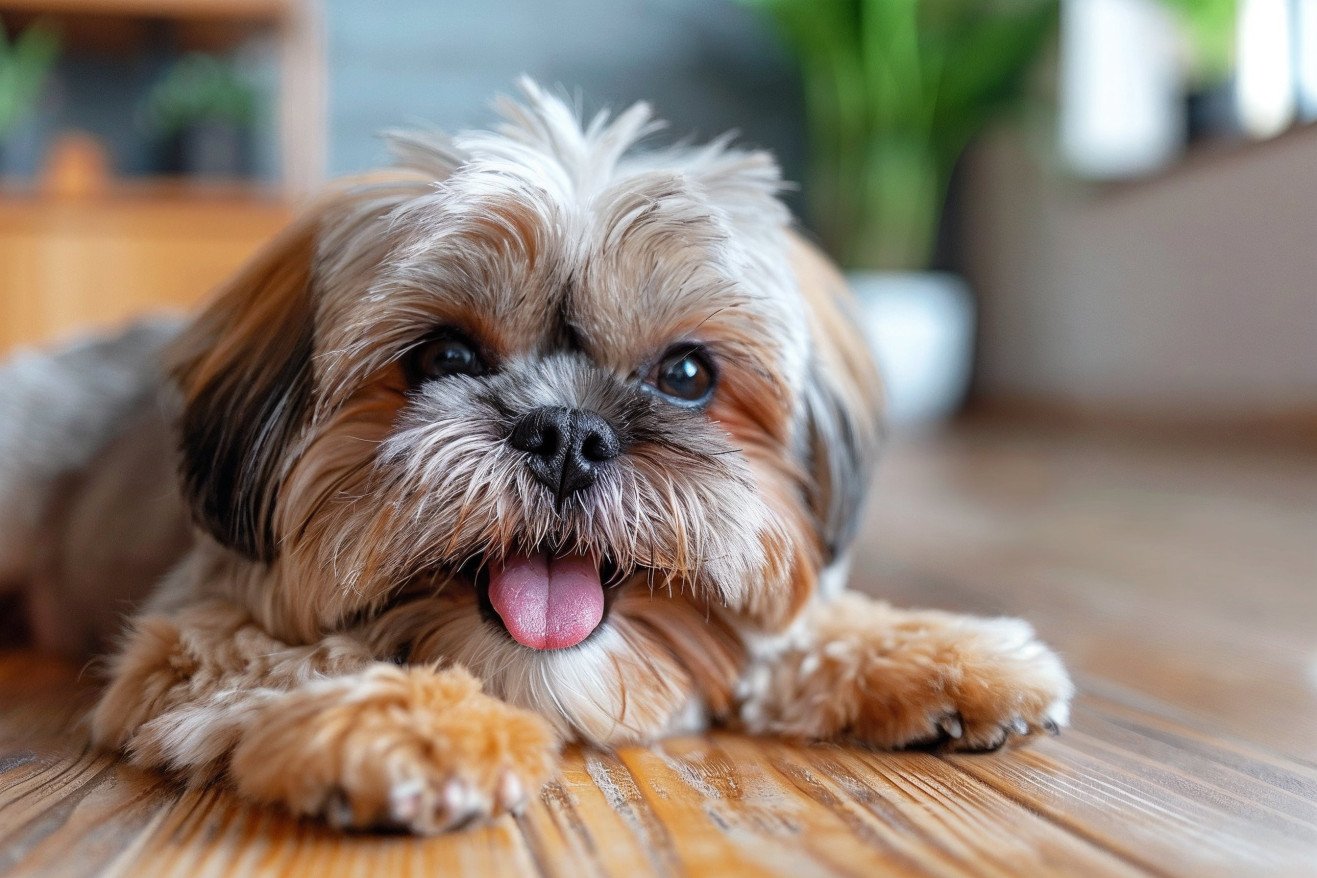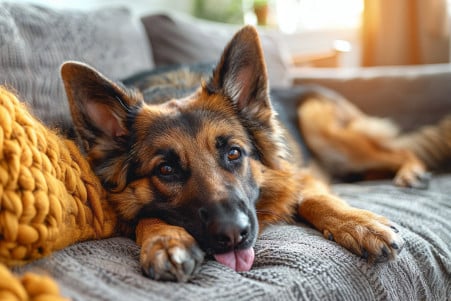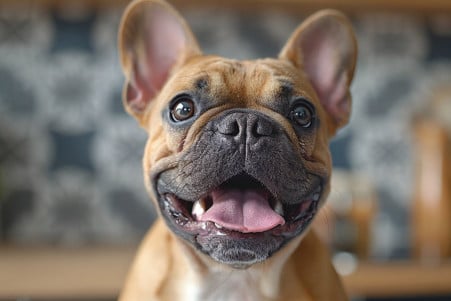Why Is My Dog Licking the Floor? Insights into Canine Behavior
16 March 2024 • Updated 15 March 2024

If your dog has suddenly started licking the floor, there may be more to it than just a strange quirk. While dogs may lick the floor to get the taste of a food they’ve smelled, constant licking may be a sign of stress, boredom, or an underlying medical condition like gastrointestinal issues.
If the licking continues, it’s important to see a vet to rule out medical problems and possibly get help for anxiety or other behavioral issues.
This article will cover a wide variety of topics from the latest in veterinary science, animal behavior studies, and dog nutrition to help you understand why your dog may be licking the floor. By looking at these different disciplines, we hope to give you a well-rounded view of the harmless and concerning reasons for this behavior so that you can be best equipped to help your dog stay healthy and happy.
Why is my dog licking the floor?
Getting to the Bottom of Why Your Dog Licks the Floor
There are a number of reasons why dogs may lick the floor, some of which are behavioral. For example, Great Pet Care notes that dogs may be licking the floor to find food that they’ve dropped, essentially turning the floor into a buffet. This is often considered normal behavior.
However, the same article explains that licking the floor when there’s no food present could be a sign of an underlying issue like stress or anxiety that’s being expressed through repetitive behaviors.
Another reason dogs may lick the floor is that they’re seeking sensory input. Dharamsala Animal Rescue explains that if dogs are bored, they may develop obsessive-compulsive behaviors, and licking the floor may be a way for them to self-soothe. Stress can also lead to stress-induced behaviors, which may cause dogs to lick the floor to soothe themselves and release endorphins that help them feel better.
In some cases, dogs may be licking the floor because they’ve learned that the behavior is rewarding, whether that’s because of their owner’s response or because they’ve seen another dog do it. In these cases, the licking may become compulsive.
According to the Cornell University College of Veterinary Medicine, it’s important to recognize these behavioral differences so that dogs can learn to effectively cope with stress and find a balance between their natural behaviors and their environment.
Medical Issues That May Cause Floor Licking
If your dog is licking the floor excessively, one of the first things to consider is that there may be an underlying gastrointestinal issue. One study that the Animal Health Foundation references found that 74% of dogs with floor licking syndrome had a specific gastrointestinal disease, and that once these diseases were treated, the floor licking stopped or decreased.
In addition, the MSPCA-Angell says that neurological signs can be associated with stereotypic behaviors like excessive licking, which may indicate that there is a primary gastrointestinal disorder.
Nutritional imbalances can also play a role in these behaviors, and the idea of dietary deficiencies affecting neurological health and leading to compulsive licking is not out of the question. In addition, licking may be a response to pain or discomfort, much like the dystonic movements that infants with Sandifer Syndrome show in response to gastroesophageal discomfort.
Some neurological disorders may present with repetitive behaviors, and the MSPCA-Angell’s research indicates that these behaviors may be the animal’s way of dealing with internal discomfort or pain.
In light of these findings, pet owners should seek the help of a veterinarian if their dog’s licking behavior doesn’t go away or becomes excessive. A vet can help ensure that the dog gets a proper evaluation and treatment that addresses the underlying cause, which will help ensure the dog’s well-being.
Understanding a dog’s dietary requirements and the role that environmental factors play in its life can also help manage its behavior, as we’ll see in the section on diet and nutrition.
Diet and Your Dog’s Strange Floor Licking
Your dog’s diet can have a big impact on their behavior, including their strange habit of licking the floor. A study in PubMed even found that dietary nutrients can have a significant impact on dogs’ behavior through their influence on neurotransmitters.
For example, a deficiency in the amino acid tryptophan, which is a precursor to serotonin, can lead to increased aggression or stress-related behaviors that may present as compulsive licking. On the other hand, having enough tryptophan can lead to a more stable mood.
Vetericyn explains that dogs may look for nutrients they’re missing from their diet as a result of nutritional imbalances, like a lack of intake or malabsorption, which can lead to abnormal behaviors like licking. The source of their food matters, too; some additives may not be nutritionally complete and can even cause negative side effects.
Animal Wellness Magazine explains that changes in a dog’s diet, like increasing fiber or adding calming nutrients like L-theanine, can have a positive impact on their behavior.
If you want to make sure your dog’s diet isn’t the cause of their floor licking, you may want to talk to a vet or a dog nutritionist to get a personalized diet plan that can help you better understand the relationship between your dog’s diet and their behavior.
Untangling the Environmental Causes of Excessive Licking
There are a number of environmental factors that could lead to your dog licking the floor, including the presence of household cleaning products and food residue.
Even small changes in a pet’s environment, like moving furniture or construction, can cause stress, which can lead to an increase in licking as a way to cope, according to Oakbrook Animal Hospital. New scents in the home can also lead to a dog’s curiosity, which can cause them to lick to explore.
Environmental allergens are another common cause of excessive licking, according to Michelson Found Animals. Symptoms like licking between the toes or fur staining from saliva enzymes can be caused by a number of things, including licking in response to allergens like pollen, dust, or dander.
Pet owners can help reduce the risk of this type of licking by wiping their pet’s paws after they’ve been outside to remove allergens and reduce the likelihood of indoor licking.
Keeping a consistent and clean environment can help reduce unwanted licking. Paying attention to your dog’s reactions to changes in the home can also help you better understand their behavior and comfort level. This can help you better understand and potentially make changes to your home environment to make it more comfortable for your pet, which can help you better manage their licking.
How to Stop Your Dog from Licking the Floor Too Much
A study from the Cummings School of Veterinary Medicine found that excessive licking in dogs is often a sign of anxiety. Other signs of anxiety in dogs include pacing, drooling, and avoiding contact.
To help with this, it’s important to work on creating a structured environment and participating in behavioral training. By introducing consistent schedules and positive reinforcement, you can help to alleviate the root causes of your dog’s anxiety and help to redirect their licking.
In addition, it can be helpful to provide more environmental enrichment, such as interactive toys or puzzle feeders, to help keep your dog’s mind occupied and reduce licking due to boredom.
PetMD warns against using punishment, as it can increase stress and anxiety, and instead suggests using rewards to encourage different behaviors. When it comes to deterrents, it’s important to make sure that they are used in a way that is safe and doesn’t cause stress.
If your dog’s excessive licking persists despite these methods, it may be time to seek professional help. A veterinary behaviorist can offer specialized help and treatments that address the behavioral and potential medical causes of compulsive licking. By working to create a calm and stable home environment and being willing to seek out help from a professional, dog owners can help their pets overcome their excessive licking, leading to a happier and healthier life.
What Does It Mean if Your Dog Licks the Floor? A Summary
As this article has shown, there are many potential reasons why a dog might lick the floor. These range from looking for food scraps, according to Great Pet Care, to stress and gastrointestinal issues, according to a study cited by The Arkansas Democrat-Gazette.
This shows that there are many potential causes for this behavior, and it’s important to know what’s normal for your dog and what might be a sign of an underlying issue. This is especially true of the gastrointestinal problems that were found in a large number of dogs with excessive licking in the study.
It’s important to pay attention to the context and frequency of your dog’s licking. Pet parents should be aware and talk to a vet if their dog is licking the floor excessively or compulsively, as noted by Dharamsala Animal Rescue, especially if there are other symptoms that come with the licking.
In summary, knowing the ins and outs of your dog’s behavior can help you better connect with your pet and make sure that they’re healthy and happy. Being aware and taking action can help ensure that your dog is happy and healthy.


